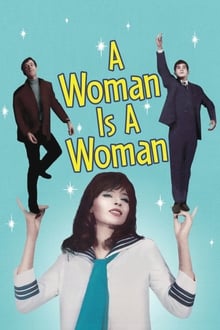
Jean-Luc Godard's first two films (À bout de souffle and Le petit soldat) were thrillers that drew inspiration from American noir, but Une femme est une femme (A Woman is a Woman, 1961) shifts gears drastically to a riff on American musical comedies, with the characters occasionally singing and dancing, and the camera jumping between realistic depictions and these musical interludes. But as one of the seminal figures of the French New Wave with its desire to shake up conventions, Godard added some elements of his own. As the film opens, the soundtrack keeps cutting abruptly in and out, an aural equivalent of the unsettling jump cuts with which he started his career. There are allusions to his earlier films and to his New Wave peers, and just a touch of sarcastic allusions to French political tensions.
The plot is fairly simple: cabaret dancer Angela (Anna Karina), who is clearly not looking to buck any traditional sex roles in an age of dawning feminism, wants a baby. Unable to get it from her partner Émile (Jean-Claude Brialy), she gradually welcomes the advances of Émile's best friend Alfred (Jean-Paul Belmondo). The way in which this triangle ultimately works out is a little surprising considering that it was made in 1961. The most appropriate adjective overall for this film is "cute". The characters spend a lot of time bickering, but always with witty ripostes. Karina here is not yet the great actress of later roles, and Godard uses her instead as essentially a Barbie doll (nice to look at, not much there), but it works well enough for this particular story. The film was shot with no fixed script, and while it's not a free-for-all, there are clearly improvisational elements here that only add to the film's charm, such as the characters' encounters with everyday Parisians in street scenes.